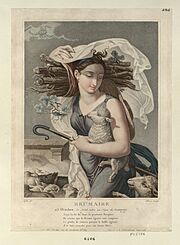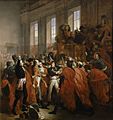Coup of 18 Brumaire facts for kids
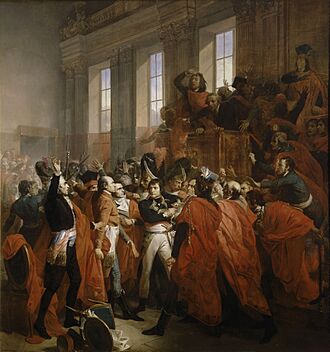
General Bonaparte during the coup d'état of 18 Brumaire in Saint-Cloud, painting by François Bouchot, 1840
|
|
| Date | 9 November 1799 |
|---|---|
| Location | Château de Saint-Cloud |
| Participants |
|
| Outcome |
|
The coup of 18 Brumaire was a sudden takeover of power in France. It brought Napoleon Bonaparte to lead France as its First Consul. Many historians believe this event marked the end of the French Revolution. It soon led to Napoleon becoming the emperor.
This takeover, called a coup d'état, happened without much bloodshed. It replaced the old government, known as the Directory, with a new one called the French Consulate. This happened on November 9, 1799. In the special French Republican calendar, this date was 18 Brumaire, Year VIII.
Contents
Why the Coup Happened
| 8 | Brumaire | VIII | ||||||||||||||||||||||||||||||||||||||||||||||||||||||||||||||||||||||||||||||||||||||
|---|---|---|---|---|---|---|---|---|---|---|---|---|---|---|---|---|---|---|---|---|---|---|---|---|---|---|---|---|---|---|---|---|---|---|---|---|---|---|---|---|---|---|---|---|---|---|---|---|---|---|---|---|---|---|---|---|---|---|---|---|---|---|---|---|---|---|---|---|---|---|---|---|---|---|---|---|---|---|---|---|---|---|---|---|---|---|---|---|
|
|
|
|
|
||||||||||||||||||||||||||||||||||||||||||||||||||||||||||||||||||||||||||||||||||||
In 1799, France was facing problems. Austria declared war on France, and a group called the Jacobins gained power in elections. At this time, Napoleon and France's best army were far away fighting in Egypt and Syria. Because of this, France lost several battles.
In June 1799, the Jacobins were removed from power. This left Emmanuel Joseph Sieyès, one of the five leaders of the Directory, as the most important person in the government. France's military situation got better after a big battle in Zurich. As the threat of invasion lessened, the Jacobins worried that a group wanting peace, called the Royalists, might become strong again.
When Napoleon returned to France in October, everyone saw him as a hero. Sieyès was impressed by Napoleon's military success. He thought Napoleon was the perfect general to help him with his plan to take over the government. However, Napoleon had his own secret plan. He wanted to gain power for himself, not just for Sieyès.
The biggest challenge to Napoleon's plan was the army itself. Some generals, like Jean-Baptiste Jourdan, truly believed in the idea of a republic. Others, like Jean-Baptiste Bernadotte, thought they could rule France better than anyone else. Napoleon worked hard to win over all these generals, keeping his true intentions hidden.
Before the coup, soldiers were placed around Paris in key spots. The plan was simple: first, convince the five leaders of the Directory to resign. Second, get the two parts of the French parliament, the Council of Ancients and the Council of Five Hundred, to choose a new group. This new group would then write a new constitution that suited the plotters' goals.
The Day of the Coup: 18 Brumaire
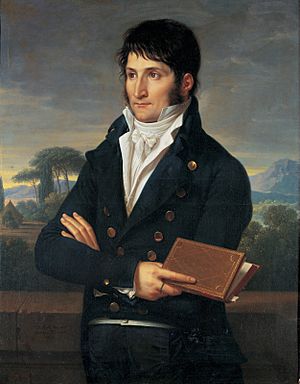
On the morning of 18 Brumaire, Napoleon's brother, Lucien Bonaparte, tricked the two Councils. He told them that a Jacobin takeover was about to happen in Paris. He convinced them to move to the safe suburban Château de Saint-Cloud. Napoleon was put in charge of protecting the Councils and given command of all the local troops.
Later that morning, Sieyès and Roger Ducos resigned from the Directory. Charles Maurice de Talleyrand-Périgord, a close friend of Napoleon and former Minister of Foreign Affairs, pressured another Director, Paul Barras, to resign as well.
With three of the five Directors gone, the Directory could no longer properly function. However, the two remaining Jacobin Directors, Louis-Jérôme Gohier and Jean-François-Auguste Moulin, were very angry. Napoleon's friend, General Jean Victor Marie Moreau, arrested both men the next day. They were forced to give up.
Unlike the Directory, the two Councils were not easily scared. They continued to meet and discuss the situation.
The Next Day: 19 Brumaire
By the next day, most of the members of parliament realized they were not being protected from a Jacobin uprising. Instead, they were facing an attempted coup. When they refused to give in, Napoleon marched into their meeting rooms. He was escorted by a small group of soldiers called grenadiers. This moment, perhaps unplanned, turned the political takeover into a military one.
Napoleon found the Council of Ancients resistant, even with many soldiers around. He was met with shouts as he told them harsh truths, like "the Republic has no government." He also said, "the Revolution is over." One member asked, "What about the Constitution?" Napoleon replied that they themselves had already broken it many times. He said it no longer had anyone's respect.

Napoleon's welcome by the Council of Five Hundred was even worse. His grenadiers entered just as the Jacobins in the room were questioning if Barras's resignation was legal. When Napoleon entered, he was pushed and even attacked. Some stories say he almost fainted. It was not Napoleon himself, but his brother Lucien, who was the president of the Council, who called on the soldiers to protect their leader. Napoleon escaped, but only because his soldiers used force.
A motion was quickly made in the Council of Five Hundred to declare Napoleon an outlaw. At this point, Lucien left the room. He told the soldiers guarding the Councils that a group of members in the Five Hundred were terrorizing the others with daggers. According to one historian, Lucien pointed to Napoleon's pale, bloody face as proof. (Though some say Napoleon scratched his own face in anger until it bled.) Then, in a dramatic move, Lucien grabbed a sword. He promised to stab his own brother if Napoleon was a traitor. Lucien then ordered the soldiers to remove the violent members from the room. Grenadiers led by General Joachim Murat marched into the meeting hall and broke up the Council. This effectively ended the Directory government.
The Council of Ancients then passed a law. It closed the Councils for three months. It also named Napoleon, Sieyès, and Ducos as temporary leaders, called consuls. Some members of the Five Hundred who were rounded up later agreed to these changes. This was how the Directory and the Councils came to an end.
What Happened Next
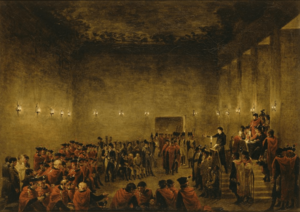
Setting Up the New Government
With the old Council gone, the people who planned the coup created two new groups. Each group had twenty-five members from the old Councils. These groups were pressured into creating a temporary government. This was the first form of the Consulate, with Napoleon, Sieyès, and Ducos as the main leaders. The fact that ordinary people in the streets didn't react much showed that the Revolution was truly over. People were tired of fighting and just wanted a stable government. Any resistance from Jacobin officials in the provinces was quickly stopped. Twenty Jacobin members were sent away, and others were arrested.
The new groups then wrote a new constitution, called the "Constitution of the Year VIII". It was short and not very clear. It was the first constitution since the Revolution that did not include a Declaration of Rights.
Napoleon made sure that this new constitution gave the First Consul the most power. He knew he would be the First Consul. He also appointed the Senate, and the Senate was in charge of explaining the constitution. This allowed Napoleon to rule by issuing decrees. Other parts of the government, like the Conseil d'État and Tribunat, became less important. All these changes eventually led to the rise of the First French Empire, with Napoleon as emperor.
Legacy of the Coup
Years later, in 1852, a thinker named Karl Marx wrote a famous essay called The Eighteenth Brumaire of Louis Bonaparte. This essay was about a different event: the 1851 coup d'état by Napoleon III. Napoleon III was Napoleon Bonaparte's nephew. Marx believed that Napoleon III was not as important as his famous uncle. He famously wrote: "Hegel remarks somewhere that all great world-historic facts and personages appear, so to speak, twice. He forgot to add: the first time as tragedy, the second time as farce." This means that important events sometimes repeat themselves, but the second time they are less serious or grand.
Images for kids
-
Lucien Bonaparte, President of the Council of Five Hundred, who engineered the coup that brought his brother to power
-
Exit liberté à la François (1799), caricature by James Gillray depicting Napoleon and his grenadiers driving the Council of Five Hundred from the Orangerie
-
The "Salle des Cinq-Cent" in Saint-Cloud on the evening of 18 Brumaire, An VIII by Jacques Sablet, c. 1799
 | William L. Dawson |
 | W. E. B. Du Bois |
 | Harry Belafonte |


